
 |
|
The Phantom of the Opera (2004) Cast: Emmy Rossum, Gerard Butler, Patrick Wilson, Miranda Richardson, Minnie Driver, Jennifer Ellison, Ciaran Hinds, Simon Callow, Victor McGuire, Murray Melvin, Kevin McNally, James Fleet, Paul Brooke 2004 – 134 minutes Rated: Reviewed by Dustin Putman, December 4, 2004.  Having seen Andrew Lloyd Webber's stage musical only once, during a lackluster tour in Baltimore, Joel Schumacher's faithful big-screen adaptation of "The Phantom of the Opera" is superior in its every aspect. From the meticulously designed narrative, to the arresting performances, to the note-perfect singing, to the powerful music arrangement, to the sweeping production design and cinematography, to even the story's cumulative emotional resonance, this haunting love story has been spatially opened up and cinematically invigorated in a way that the limits of the stage are unable to. For myself, the theater production was viewed from a distance; while visually impressive, it was difficult to grow too attached by anyone or care about their futures, the human element sinking under the weight of its all-consuming technical attributes.
Having seen Andrew Lloyd Webber's stage musical only once, during a lackluster tour in Baltimore, Joel Schumacher's faithful big-screen adaptation of "The Phantom of the Opera" is superior in its every aspect. From the meticulously designed narrative, to the arresting performances, to the note-perfect singing, to the powerful music arrangement, to the sweeping production design and cinematography, to even the story's cumulative emotional resonance, this haunting love story has been spatially opened up and cinematically invigorated in a way that the limits of the stage are unable to. For myself, the theater production was viewed from a distance; while visually impressive, it was difficult to grow too attached by anyone or care about their futures, the human element sinking under the weight of its all-consuming technical attributes.
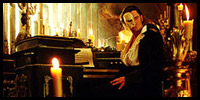 In comparison, this filmed version—certainly the most ambitious to ever find its way to the screen—finds a way to marry its grandiose surroundings with a tale of quietly stunning intimacy. Director Joel Schumacher (2003's "Phone Booth") has accomplished what must have been a daunting undertaking, his "The Phantom of the Opera" proving to be a tour de force that surpasses 2002's Oscar-winning "Chicago" in sheer spectacle and potency.
In comparison, this filmed version—certainly the most ambitious to ever find its way to the screen—finds a way to marry its grandiose surroundings with a tale of quietly stunning intimacy. Director Joel Schumacher (2003's "Phone Booth") has accomplished what must have been a daunting undertaking, his "The Phantom of the Opera" proving to be a tour de force that surpasses 2002's Oscar-winning "Chicago" in sheer spectacle and potency.
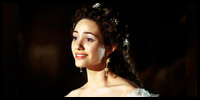 In 1919 Paris, an elderly man attends an auction taking place at the run-down Opera House, where a newly-refurbished chandelier is being sold alongside a music box in the form of a cymbal-playing stuffed monkey—two artifacts that hold special significance from his past. From here, the time period rewinds itself back to the Opera House in all its majestic glory, circa 1870. When overblown diva actress Carlotta (Minnie Driver) opts out of the lead role in the theater's latest production, a last minute replacement is found in 16-year-old chorus singer Christine Daae (Emmy Rossum), whose beautiful operatic voice catches the ears of not only the house's new owners, Firmin (Ciaran Hinds) and Andre (Simon Callow), but also the mythical Phantom (Gerard Butler). Shielding himself from view in the rafters and making his home in the underground crypt below the theater, the Phantom—his partially deformed face hidden by a half-mask—has been seductively entrancing Christine while giving her singing lessons. When Christine meets up with handsome childhood friend Raoul (Patrick Wilson) and begins her first romance, the Phantom's madness and jealousy grow. Threatening the theater if Christine does not continue receiving the lead parts, the Phantom soon makes it abundantly clear that he will do anything, and kill anyone he needs to, to get his way.
In 1919 Paris, an elderly man attends an auction taking place at the run-down Opera House, where a newly-refurbished chandelier is being sold alongside a music box in the form of a cymbal-playing stuffed monkey—two artifacts that hold special significance from his past. From here, the time period rewinds itself back to the Opera House in all its majestic glory, circa 1870. When overblown diva actress Carlotta (Minnie Driver) opts out of the lead role in the theater's latest production, a last minute replacement is found in 16-year-old chorus singer Christine Daae (Emmy Rossum), whose beautiful operatic voice catches the ears of not only the house's new owners, Firmin (Ciaran Hinds) and Andre (Simon Callow), but also the mythical Phantom (Gerard Butler). Shielding himself from view in the rafters and making his home in the underground crypt below the theater, the Phantom—his partially deformed face hidden by a half-mask—has been seductively entrancing Christine while giving her singing lessons. When Christine meets up with handsome childhood friend Raoul (Patrick Wilson) and begins her first romance, the Phantom's madness and jealousy grow. Threatening the theater if Christine does not continue receiving the lead parts, the Phantom soon makes it abundantly clear that he will do anything, and kill anyone he needs to, to get his way.
 The rousing success of "The Phantom of the Opera" falls upon the hands of two people: writer-director Joel Schumacher, little by little making amends for his destruction of the "Batman" series with 1995's overblown "Batman Forever" and 1997's laughable "Batman & Robin," and Andrew Lloyd Webber, creator of the stage musical who co-writes, composes the music, and produces here. Their close collaboration has led to a miraculous victory that, like 2001's "Moulin Rouge" and 2002's "Chicago" before it, has effortlessly brought the movie musical, a genre once thought dead, into the 21st-century.
The rousing success of "The Phantom of the Opera" falls upon the hands of two people: writer-director Joel Schumacher, little by little making amends for his destruction of the "Batman" series with 1995's overblown "Batman Forever" and 1997's laughable "Batman & Robin," and Andrew Lloyd Webber, creator of the stage musical who co-writes, composes the music, and produces here. Their close collaboration has led to a miraculous victory that, like 2001's "Moulin Rouge" and 2002's "Chicago" before it, has effortlessly brought the movie musical, a genre once thought dead, into the 21st-century.
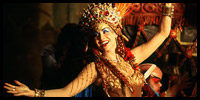 Staying amazingly true to the stage adaptation, if not so much to the original novel by Gaston Laroux, Schumacher and Webber obviously share a rooting passion for their source material, and it shows. They have opened up their surroundings, taking luscious use of exterior locations, such as atop the theater amidst the silently falling snow—a fitting backdrop for the professions of love between Christine and Raoul as the Phantom watches sadly behind a gargoyle—and the gothic-style cemetery that Christine travels to to visit her deceased father. Schumacher and Webber have also done wise in adding a more thorough wraparound story that brings further weight to the central themes, alternating back and forth sparsely, unobtrusively, and at just the right times. These sequences are shot in gritty black-and-white, mesmerizingly evoking the look and feel of silent pictures from the 1910s time period in which they are set. Finally, they have lucidly expanded upon the musical score to accompany the scene expansions and transitions, while making good by keeping all of the songs attached and in one piece.
Staying amazingly true to the stage adaptation, if not so much to the original novel by Gaston Laroux, Schumacher and Webber obviously share a rooting passion for their source material, and it shows. They have opened up their surroundings, taking luscious use of exterior locations, such as atop the theater amidst the silently falling snow—a fitting backdrop for the professions of love between Christine and Raoul as the Phantom watches sadly behind a gargoyle—and the gothic-style cemetery that Christine travels to to visit her deceased father. Schumacher and Webber have also done wise in adding a more thorough wraparound story that brings further weight to the central themes, alternating back and forth sparsely, unobtrusively, and at just the right times. These sequences are shot in gritty black-and-white, mesmerizingly evoking the look and feel of silent pictures from the 1910s time period in which they are set. Finally, they have lucidly expanded upon the musical score to accompany the scene expansions and transitions, while making good by keeping all of the songs attached and in one piece.
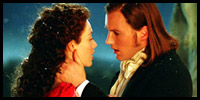 Speaking of, the musical numbers are rendered with more energy, technical prowess, and portentous beauty than even ardent fans of the tale might imagine. The overture following the 1919 prologue starts things off with a bang, the familiar, booming chords complimenting the now-decrepit Opera House's return back to its sublime state in 1870. Christine's first solo, "Think of Me," is spare and angelic, relying upon the performance and music to garner its quiet exquisiteness. "Masquerade," set at the title New Year's Eve ball where the Phantom cuts things short by finally makes his first real appearance before a frightened crowd, is delightfully choreographed and ominously resplendent. And the title song, an organ rock opera piece, weaves an unforgettable spell as the Phantom lures Christine into the catacombs below the theater.
Speaking of, the musical numbers are rendered with more energy, technical prowess, and portentous beauty than even ardent fans of the tale might imagine. The overture following the 1919 prologue starts things off with a bang, the familiar, booming chords complimenting the now-decrepit Opera House's return back to its sublime state in 1870. Christine's first solo, "Think of Me," is spare and angelic, relying upon the performance and music to garner its quiet exquisiteness. "Masquerade," set at the title New Year's Eve ball where the Phantom cuts things short by finally makes his first real appearance before a frightened crowd, is delightfully choreographed and ominously resplendent. And the title song, an organ rock opera piece, weaves an unforgettable spell as the Phantom lures Christine into the catacombs below the theater.
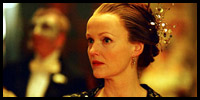 The three leads, all of them still generally unknown actors who probably won't remain unknown for long, are excellent. Emmy Rossum (2004's "The Day After Tomorrow") is close to faultless as the unimposing Christine. Rossum is beautiful, both physically and in her star-worthy vocal work, and embodies her role with an appropriate naivety offset by a childhood-influenced melancholy. As the Phantom, Gerard Butler (2003's "Timeline") manages the tricky assignment of being deeply sensual, sympathetic, and threatening all at once, and pulls off the task in spades. There is an immediacy in the scenes between Christine and the Phantom, the latter of whom knows his true love will be better off without him but is unable to let her go. As Raoul, the ne'er-do-well suitor caught in the middle, Patrick Wilson (2004's "The Alamo") immediately defies his initial "young, dumb hunk" looks the first time he appears on-screen. Wilson is a fine actor, well-modulated and measured in his performance. Making solid impressions in supporting roles are Minnie Driver (2004's "Ella Enchanted"), deliciously and intentionally over-the-top as loud, spoiled opera performer Carlotta; Miranda Richardson (2004's "The Prince & Me"), as the theater's Madame Giry, who shares a deep secret concerning the origins of the Phantom; and lovely newcomer Jennifer Ellison, as Christine's chorus singer best friend, Meg.
The three leads, all of them still generally unknown actors who probably won't remain unknown for long, are excellent. Emmy Rossum (2004's "The Day After Tomorrow") is close to faultless as the unimposing Christine. Rossum is beautiful, both physically and in her star-worthy vocal work, and embodies her role with an appropriate naivety offset by a childhood-influenced melancholy. As the Phantom, Gerard Butler (2003's "Timeline") manages the tricky assignment of being deeply sensual, sympathetic, and threatening all at once, and pulls off the task in spades. There is an immediacy in the scenes between Christine and the Phantom, the latter of whom knows his true love will be better off without him but is unable to let her go. As Raoul, the ne'er-do-well suitor caught in the middle, Patrick Wilson (2004's "The Alamo") immediately defies his initial "young, dumb hunk" looks the first time he appears on-screen. Wilson is a fine actor, well-modulated and measured in his performance. Making solid impressions in supporting roles are Minnie Driver (2004's "Ella Enchanted"), deliciously and intentionally over-the-top as loud, spoiled opera performer Carlotta; Miranda Richardson (2004's "The Prince & Me"), as the theater's Madame Giry, who shares a deep secret concerning the origins of the Phantom; and lovely newcomer Jennifer Ellison, as Christine's chorus singer best friend, Meg.
 Save, perhaps, for a climactic showdown in the Phantom's underground lair that goes on a little too long and slows down the pacing, just about everything within "The Phantom of the Opera" has come together magnificently, creating an enriching and elegant whole. The production design by Anthony Pratt (1997's "The Butcher Boy") is baronial and amazingly detailed, staying truthful to its 19th-century era. Meanwhile, every frame of cinematographer John Mathieson's (2003's "Matchstick Men") work is like a painting brought to beauteous, reverberant life, soaking up the viewer's attention while complimenting the storyline.
Save, perhaps, for a climactic showdown in the Phantom's underground lair that goes on a little too long and slows down the pacing, just about everything within "The Phantom of the Opera" has come together magnificently, creating an enriching and elegant whole. The production design by Anthony Pratt (1997's "The Butcher Boy") is baronial and amazingly detailed, staying truthful to its 19th-century era. Meanwhile, every frame of cinematographer John Mathieson's (2003's "Matchstick Men") work is like a painting brought to beauteous, reverberant life, soaking up the viewer's attention while complimenting the storyline.
 All of this would be for naught without the heart and passion "The Phantom of the Opera" graces, particularly in the simplicity in which the tragic two-way romance is portrayed and carried out. Christine is torn between two men, one whom she is suited for, and another with whom her sexual awakening takes place. For the Phantom, his unhealthy, if soulful, relationship with Christine means much more to him, making the inevitable decision he arrives upon at the end genuinely heartbreaking—a trait that, somehow, the stage show lacks. Easily one of the most entertaining motion pictures of the year, "The Phantom of the Opera" is a great, old-fashioned musical with breathtaking present-day production values, a cinematic gift for the ages that finds profundity in its thematic innocence.
All of this would be for naught without the heart and passion "The Phantom of the Opera" graces, particularly in the simplicity in which the tragic two-way romance is portrayed and carried out. Christine is torn between two men, one whom she is suited for, and another with whom her sexual awakening takes place. For the Phantom, his unhealthy, if soulful, relationship with Christine means much more to him, making the inevitable decision he arrives upon at the end genuinely heartbreaking—a trait that, somehow, the stage show lacks. Easily one of the most entertaining motion pictures of the year, "The Phantom of the Opera" is a great, old-fashioned musical with breathtaking present-day production values, a cinematic gift for the ages that finds profundity in its thematic innocence.
|
© 2004 by Dustin Putman |














